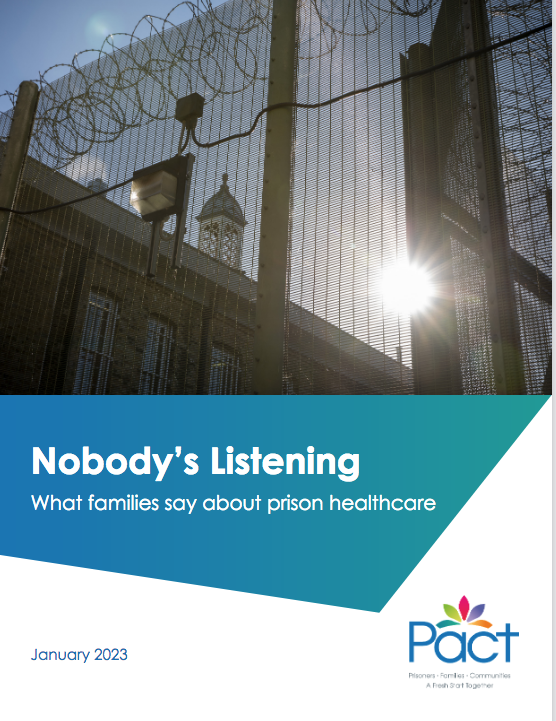Prisoners’ mental and physical health are at ‘historically low levels’ following Covid, according to a new study into the welfare of prisoners which reports ‘near record levels’ of self harm with almost 700 incidents for every thousand prisoners. The charity Pact (Prison Advice and Care Trust) interviewed 33 families caught up in the criminal justice system and argues that greater involvement in prisoners’ healthcare would ‘reduce deaths in custody, relieve pressure on the NHS and the criminal justice system, and cut crime’.
The report (Nobody’s Listening) argues that families are too often ‘locked out’ of the system despite overwhelming evidence the extent of the health problems facing prisoners – for example, half of prisoners, and three in five female prisoners, have mental health problems and rates of self-harm are close to an all time high (684 incidents per 1,000 prisoners).
In her foreword, Juliet Lyon, chair of the Independent Advisory Panel on Deaths in Custody, points out that since the onset of the pandemic more than 40,000 prisoners and over 42,000 members of staff are reckoned to have contracted COVID-19. ‘Of these, it is not known how many are suffering from Long COVID – screening, diagnosis and treatment are still needed. This is a period of painstaking recovery,’ she writes. Prisoners have a life expectancy 20 years younger than the general population.
Andy Keen-Downs, Pact CEO, said that all the research and guidance stressed ‘the crucial role that families have in caring for loved-ones who are ill’. ‘But all too often guidance about family involvement is simply not put into practice, leaving family members locked out, prisoners struggling and a healthcare system under pressure. Ensuring that prisoners get access to the right healthcare isn’t just about doing the right thing – it creates safer prison regimes, reduces reoffending and relieves pressure on the NHS.’
The report flagged research suggesting that people in custody have ‘a physical health status’ ten years older than people at liberty and a life expectancy 20 years younger than the general population. ‘In the 12 months to December 2021 the highest ever annual number of deaths in custody was recorded – 371, more than one death a day,’ it continued. ‘Of these deaths, 250 were classed as “natural causes” – an increase of 13% from the previous 12 months. The Independent Advisory Committee into Deaths in Custody suggest that ‘many of these deaths are preventable’. According to the study, the number of prisoners aged over 60 has more than tripled in the last 20 years and the deaths of prisoners over-50 account for more than half of the deaths in custody. The report quoted the Royal College of Psychiatrists which reckoned around 10% of the prison population – about 8,000 people a year – should not be in prison in the first place and should have instead been be diverted into mental health treatment.







